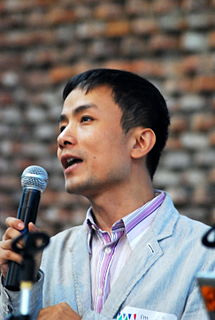A Quote by Geert Wilders
I don't believe in political self-censorship.
Quote Topics
Related Quotes
I saw that publishing all over the world was deeply constrained by self-censorship, economics and political censorship, while the military-industrial complex was growing at a tremendous rate, and the amount of information that it was collecting about all of us vastly exceeded the public imagination.
Self-censorship happens not only in China, or Iran or ex-Soviet places. It can happen anywhere. If an artist penetrates a certain taboo or a certain power through their work, he or she will face this problem. I'm always saying that commercial censorship is our foremost censorship globally today. Why do we still pretend we are free?
Self-censorship as a result of intimidation or social pressures, sometimes referred to as "political correctness", constitutes a serious obstacle to the proper functioning of democracy. It is important to hear the views of all persons,including the "silent majority", and to give heed to the weaker voices.

































